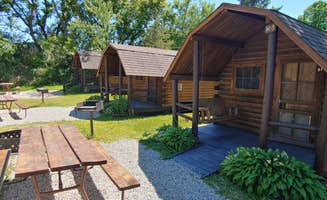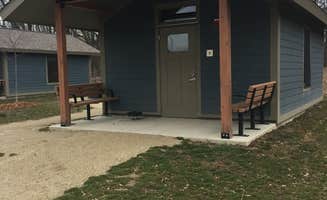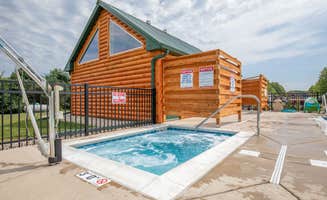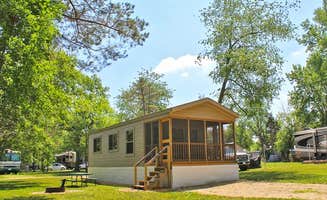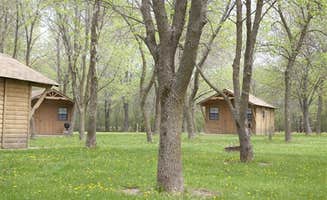Cabin camping near Great Lakes, Illinois offers year-round accommodations within an hour's drive of Chicago. The region features a mix of wetlands, prairie restoration areas, and glacial topography with elevations ranging from 580 to 780 feet above sea level. Winter temperatures often drop below freezing from December through February, making heated cabin options particularly valuable during colder months.
What to do
Kayaking and canoeing on calm waters: At Turner Lake South — Chain O' Lakes State Park, visitors can explore multiple interconnected waterways. "I love to kayak through here because I don't need to paddle through the river unless I'm feeling competitive. I enjoy this route for the wildlife and nature scenery. I've seen beavers, minks, ferrets, and sand cranes on my two trips so far," notes one paddler.
Mountain biking on extensive trail systems: Camp Bullfrog Lake provides direct access to miles of single-track trails. "The mountain bike trails were awesome. If you're a trail rider, you must stay here. The lack of shade won't matter because you'll be riding all day. There are miles and miles of trails. We saw several vehicles carrying top of the line bikes in and out all day," reports a camper who visited with family.
Horseback riding options: Richard Bong State Recreation Area offers designated equestrian trails alongside other recreational activities. "This place has everything a clean campground, great hiking trails, ATV trails, a nature center, a self-guided audio hike, fishing and more," shares a visitor who appreciated the diverse activity options.
What campers like
Clean shower facilities: Camp Reinberg receives consistent praise for its well-maintained bathrooms. "Supreme suburban camping! This gem of a campground is run by the Cook County Forest Preserve District and the care they have for it shows! There are pavilions, air conditioned/heated dining hall, shower building, restrooms (seriously the cleanest I've ever seen, even the ceilings were cleaned!) and cabins," one reviewer enthused.
Free firewood availability: Some Cook County facilities include complimentary wood with stays. "We camp here at least 2 times per year and have only had good experiences. Clean facilities, good hikes and good campsites (either in the woods or out of the woods). Highly recommend," says a repeat visitor to Camp Sullivan, noting the included firewood as a money-saving perk.
Affordable options for budget campers: Basic sites at some locations start at remarkably low rates. "These campsites are as low as $12/night!! One of my favorite spots to test new gear. Family friendly. There's some small trails around as well that are beginner. There was electricity, however those sites are $25/night," explains a budget-conscious camper at Turner Lake South.
What you should know
Gate closure timing: Security measures vary between parks, with some implementing strict access controls. "The gates close at 10:PM and there are tire shredders, you can leave but you can't get back in… unless you want to walk 2+ miles in the dark," warns a camper about Chain O' Lakes State Park.
Seasonal insect conditions: The wetland environment contributes to significant mosquito and tick populations. "SO many ticks. With a baby crawling that needed to be set free, we were constantly doing checks. Luckily our screen house pop up on a tarp that was sprayed ahead for tick repellent plus a blanket on top of that did the trick, but they literally fall out of the trees into people!" cautions a family that stayed at Honeysuckle Hollow — Chain O' Lakes State Park.
Shared electrical hookups: Some campgrounds have unusual utility arrangements. "These sites share an electric box. Some spaces the box is further than 30 feet from the pad. A lot of the spaces are also crowded together. Recommend sites 23 to 46 for spacing and electric distance," advises an RVer who stayed at Honeysuckle Hollow.
Tips for camping with families
Beach and water activities: Fish Lake Beach Camping Resort offers multiple water recreation options. "We stayed in one of the tent sites across the road from the lakefront sites. There are about 8 tent/pop up sites and the rest of the campground is for RVs. I recommend the lakefront tent sites, they are spacious and you can fish right from your site! The lake is beautiful and surprisingly picturesque as it is all nature preserve on the opposite side."
Raccoon preparation: Wildlife management requires extra attention at some parks. "The raccoons at night here are no joke. The second it's dusky, they come scavenging for absolutely anything food has touched. So basically, eat dinner and do s'mores early, then everything must be packed into cars for the night and all surfaces wiped down," advises a family that camped at Honeysuckle Hollow.
Child-friendly cabin layouts: Several parks feature bunk bed configurations suitable for families. "The large cabin was perfect for family camping," notes a visitor to Camp Bullfrog Lake, which offers small to medium-sized cabin options with varying levels of amenities.
Tips from RVers
Dump station planning: Some parks have limited dumping facilities that require strategic timing. "The dump station was near the entrance to the camping loop and had potable water. It was also very busy and we had to wait when filling up and again when dumping," reports an RVer who stayed for a week at Honeysuckle Hollow.
Site selection for shade: Most campgrounds have both exposed and shaded sites. "Our site was #2. For the most part, all of the 30/50 amp sites are very similar. Can't really say one appears to be better than the rest. Sites # 4 and 5 probably have the longest length parking pad. I believe this is a relatively newer campground. There is NO shade during the day," explains an RVer who visited Camp Bullfrog Lake.
Water access limitations: Water hookups are inconsistent across the region's campgrounds. "No water hooks up. Water on site but, not ideal. Really nice views. Very quiet. Super friendly staff and neighbors," notes a camper who stayed at Camp Bullfrog Lake, highlighting a common challenge for RVers in the area.


